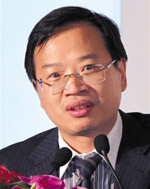|
|
 0 Comment(s)
0 Comment(s) Print
Print E-mail China.org.cn, November 11, 2012
E-mail China.org.cn, November 11, 2012
Three researchers working for China's top think tanks were interviewed yesterday by The Beijing News to elaborate on ways to realize the target set by the Communist Party of China (CPC) to double China's per-capita income during the country's next generation of leadership, who will be named as the 18th National Congress of the CPC comes to an end later this week.
 |
|
 |
|
Gao Huiqing, Director from the Economic Forecast Department of?China State Information Center.? |
Yang Zhiyong, researcher from?National Academy of Economic Strategy, CASS.? |
Zhang Monan, researcher?from the Economic Forecast Department of China State Information Center.? |
The Chinese mainland aims to double its per-capita income level by 2020, President Hu Jintao said in his remarks at the opening of the National Congress last Thursday, thus setting the benchmark for China's new generation of leaders.
China's National Bureau of Statistics data shows that in 2010, China's urban resident per capita disposable income was 19,109 yuan (US$3,033), and rural per capita net income was 5,919 yuan (US$940).
China is currently facing a period of economic structural adjustment as it grapples with how to reduce the income gap between the rich and poor, how to raise per-capita income, and how to reduce the costs of reform. Economic policy experts explore ways that China could achieve these ends:
1.?Increasing per-capita income: State-owned enterprises can be the first to share their profits with public coffers
Gao Huiqing, Director from the Economic Forecast Department of the China State Information Center, elaborates his solutions to achieve the per-capita income target.
First, China's economy must maintain a certain speed of growth; second, the income distribution should incline to raise grassroots income.
Gao said in an interview that the reform of income distribution is a systematic project. For some sectors, such as state-owned enterprises, the conditions are ripe and immediate action could be taken first —profit of SOEs to can be used in state finance to raise the overall level of China's social security system.
Zhang Monan, a researcher also from the Economic Forecasting Department of China State Information Center, said China state finance should transfer more funds into education and health care to establish a long-term base to raise per-capita incomes. In addition, reform measures should be taken to break the existing practice of "unequal pay for equal work" because of SOE monopolies, so that small and medium enterprises and state-owned enterprises compete from the same starting line. Listed companies should be required to share their profits with the shareholders to ensure the public receives income from securities investments.
2.?Narrowing the income gap: the priority is to increase the income of less privileged people and expand the middle class
As china works towards doubling per-capita income, how can it avoid widening the already large income gap between the rich and poor? Yang Zhiyong, researcher from the Chinese Academy of Social Sciences, gave his opinions on this issue. First, society should admit that a certain income gap is reasonable as China continues to develop. The government's focus is to protect the interests of low-income persons, ensuring the rise of their living standards; at the same time, we should have different views for high-income earners. In terms of curbing the wealth acquired by monopolies and corruption, we need to improve the system. More importantly, the government should provide an equal competition environment in the process of adjusting income distribution.
Gao Huiqing said that the first priority for narrowing the income gap lies in strengthening the building of legal system. Secondly, the country should pursue more open and transparent government operations, including more transparency in the property records of officials. Third, China should further reduce government intervention in the market, and obtain a stable relationship between the government and the market.
On the issue of secondary distribution, Zhang Monan claimed that potential increases in residents' property income is greater than increases in wage income, which helps resolve the problem of an excessive wealth gap. Fiscal policies such as increasing residents' financial investment channels and redistribution by imposing property taxes could be taken.
3. Ensuring the doubling of per-capita GDP in a decade: annual growth rate of 7.2 percent needed
Together with the target of doubling per-capita GDP, President Hu Jintao also set a goal in his report to double China's overall GDP by 2020, which means that the annual GDP growth rate must reach 7.2 percent for the next eight years.
Yang Zhiyong believes that the Chinese government will give up the pure pursuit of GDP growth, but raising per-capita GDP does requires the premise of overall GDP growth. In the future, China's economic growth mode will transition from government-driven to market-driven. The transition requires system stability to build up the market confidence as well as strike a balance between efficiency and fairness.
Zhang Monan said that achieving GDP growth rate of 7.2 percent is a challenging task. The difficulty lies in how to preserve China's labor cost comparative advantage during the process of salary increases and the income distribution reform. She believes that government should increase investment in education, research and development, innovation, improve business productivity, and accelerate industrial transformation and upgrading in order to promote economic growth.
Gao Huiqing said that China's per capita GDP is still low compared to other countries. At present, China's economy is facing a transformation, which affects its economic growth speed. China will face many challenges in the future to maintain an annual 7 percent GDP growth rate.
4. Will a doubling of per-capita income lead to inflation? Little pressure of price increases in next five to six years, analysts say
Based on the principles of economics, increasing per-capita incomes would trigger rising demand, posing a risk for inflation.
Zhang Monan said there is a risk of having cost-driven inflation in the future, but it can be offset by improved production efficiency, through successful business restructuring and upgrades.
Both Yang Zhiyong and Gao Huiqing take a rather optimistic view — Yang said prices for some goods would rise due to higher labor costs, but the price of some products would go down due to increased productivity.
Guo mentioned that China will still face a serious problem of overcapacity in the next five or six years, although revenue increases will lead to rising demand. There will be a long period of offsetting excess capacity, so the pressure for inflation is small.
5. What can China learn from foreign countries? – A large piece of the pie is based on how big the pie is
In December 1960, Japan announced the start of a 10-year national income doubling plan. In 1967, real national income of Japan had doubled, reaching the target ahead of schedule.
Zhang Monan said Japan's total economy had a considerable capability before it started the income doubling plan, but China's has not yet reached such a level. For China, we still have a long way to go to increase national productivity.
The article was originally published in Chinese, and translated by Wang Zhiyong.
Opinion articles reflect the views of their authors, not necessarily those of China.org.cn.